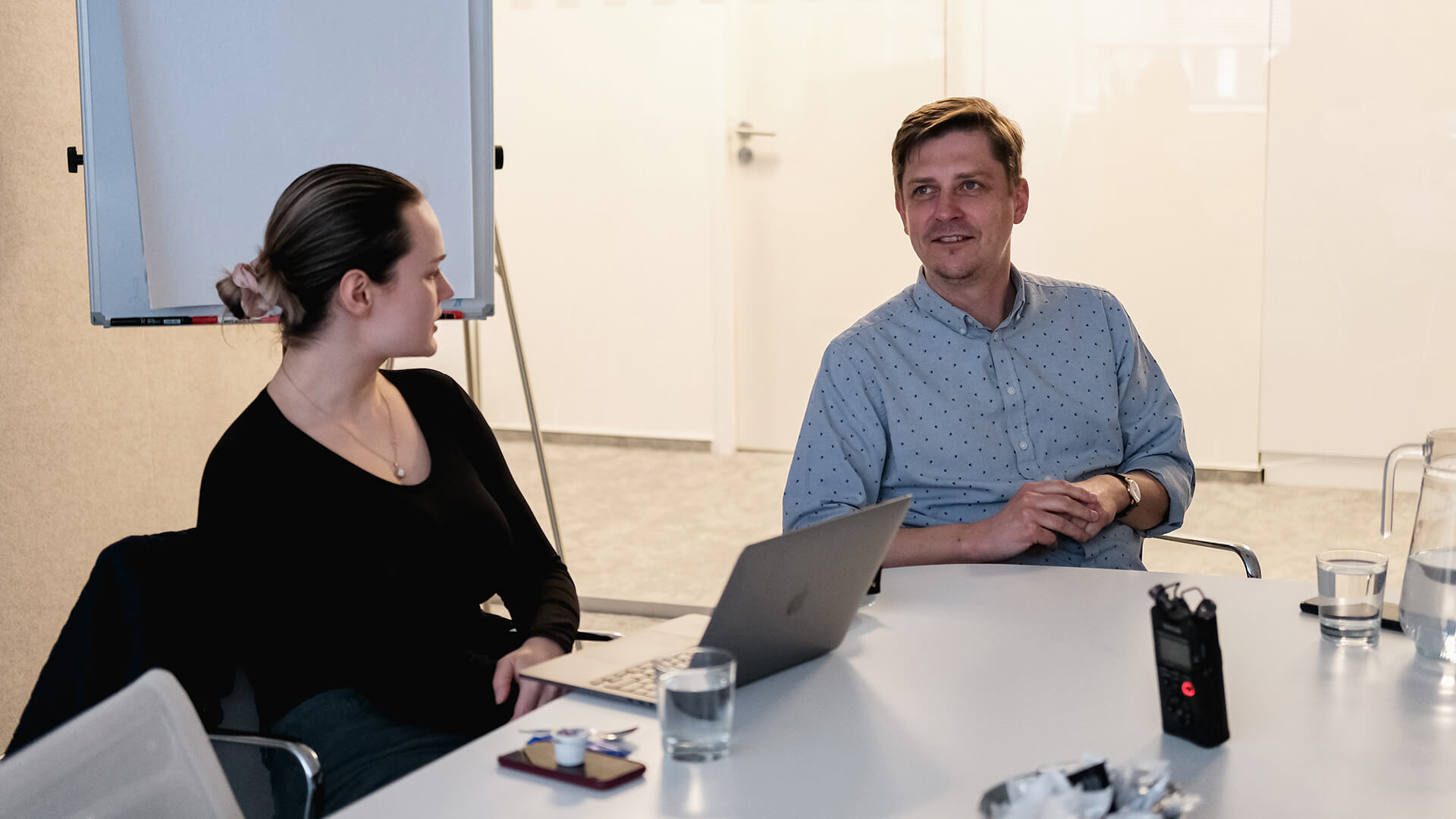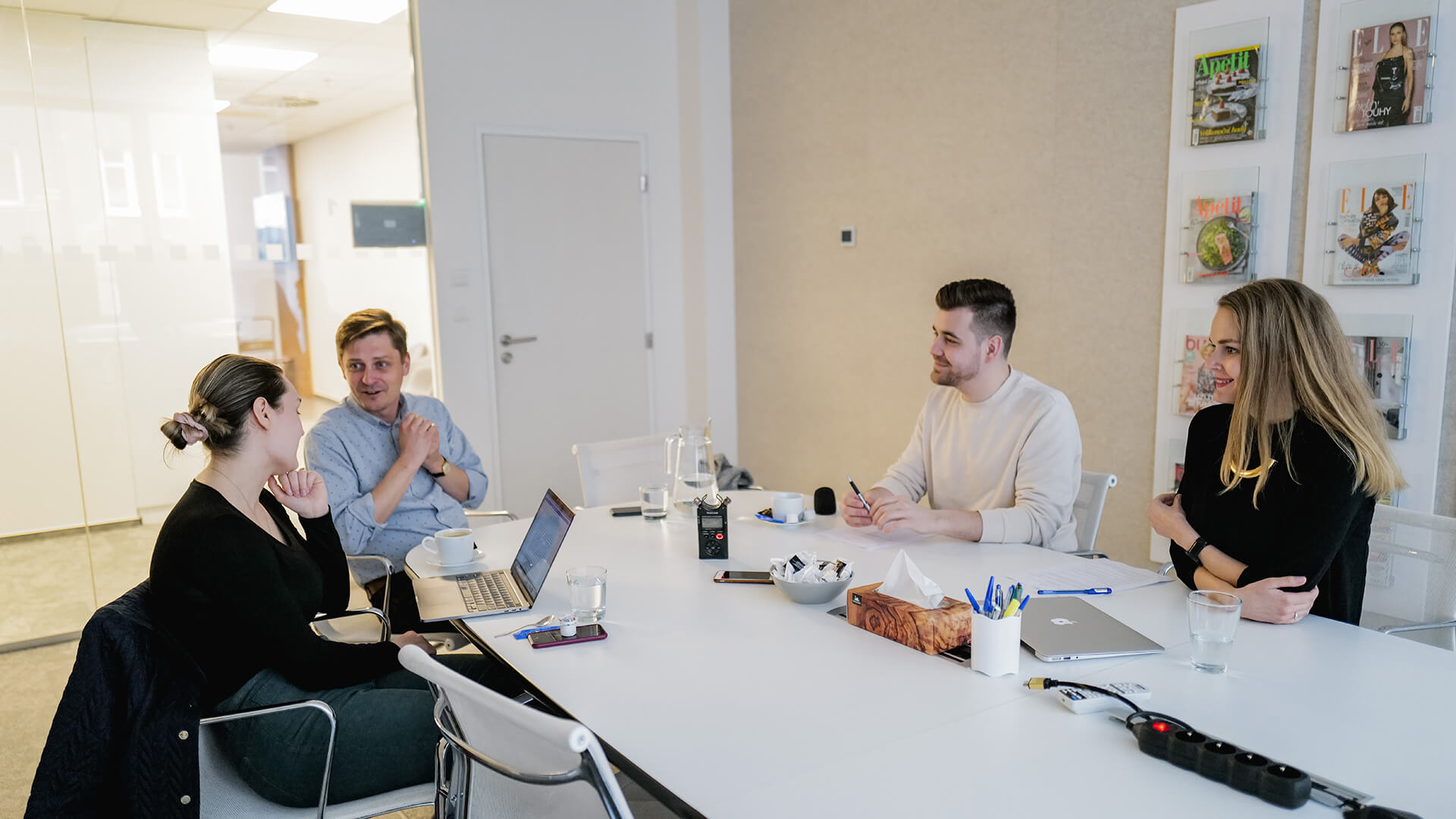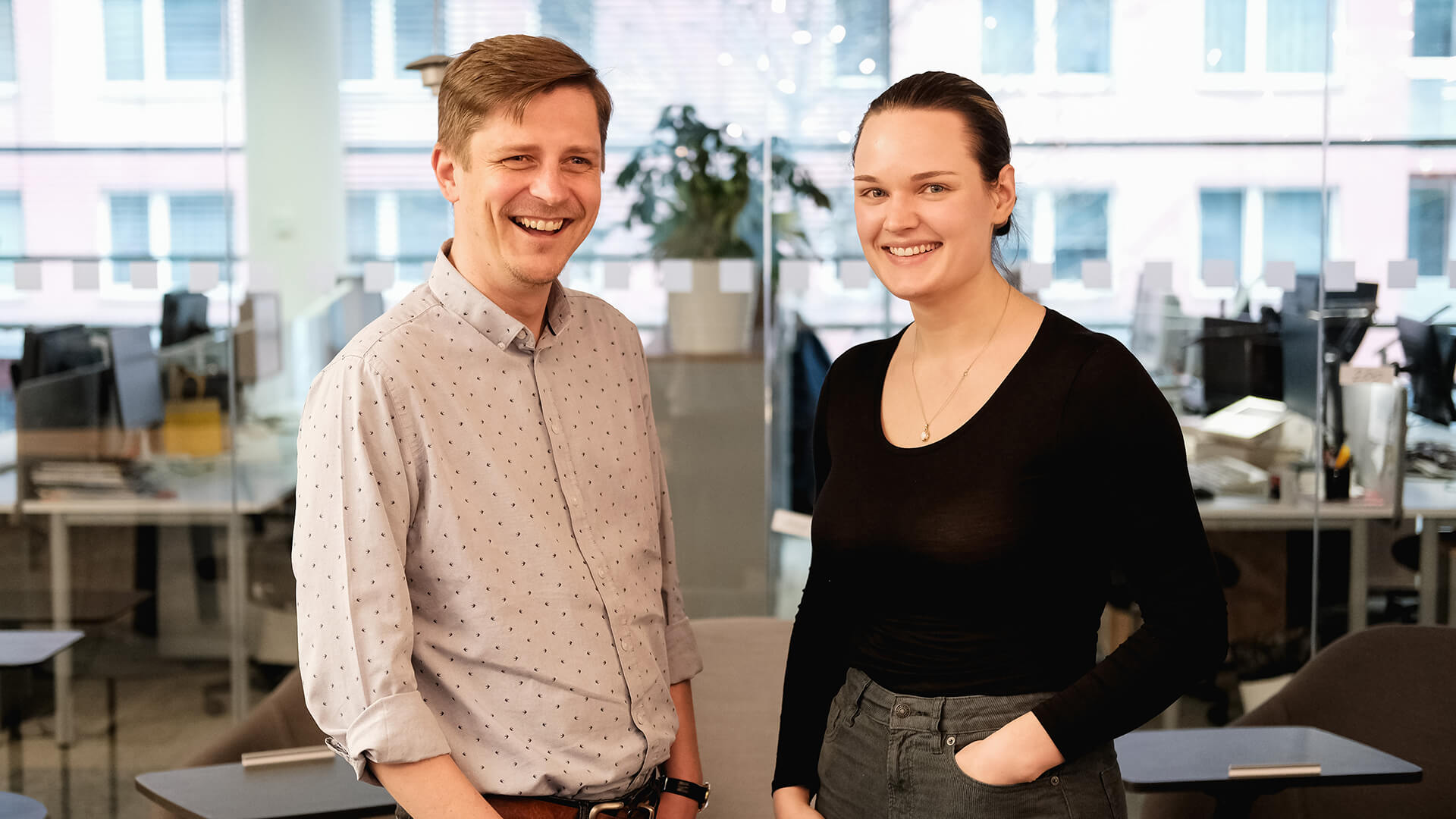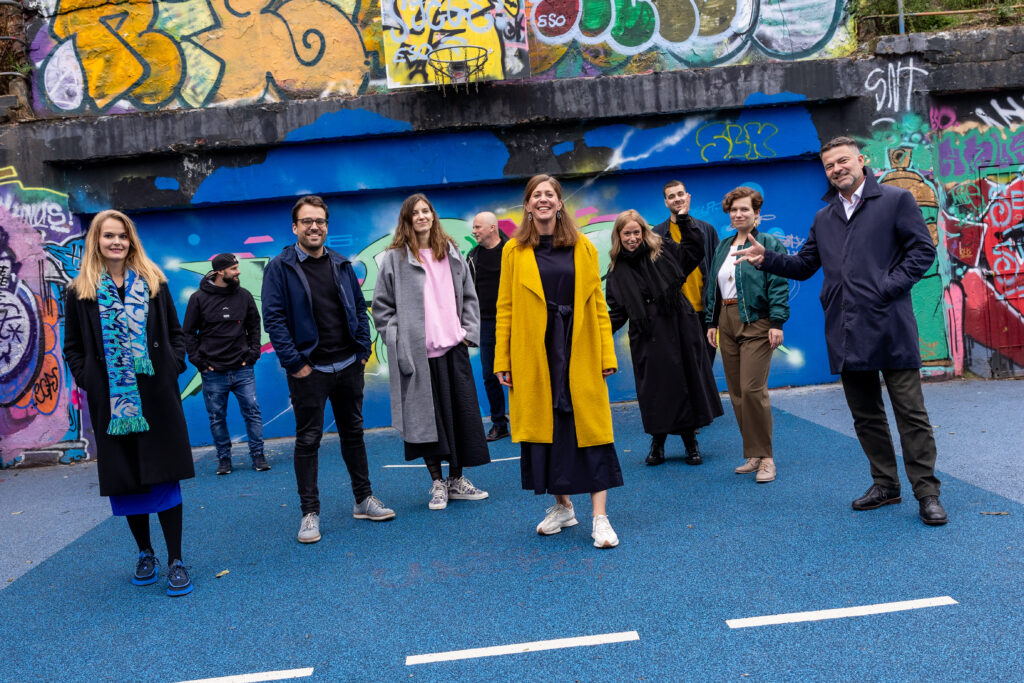Although we have met with smiles on our faces, the feelings evoked by the subject of our discussion are rather gloomy. We are realising that to lead a successful fight against disinformation, improving media literacy is not enough – we must, most of all, resolve the global psychological crisis. “Have you heard of the so-called information disorder of the society? Let’s start with that,” Monika opens the debate.
Why do you consider this term to be fundamental?
Monika: It puts disinformation in a broader context, which is often forgotten. The society suffers from information disorder, where disinformation is only one of its symptoms. We must look into the entire structure of our information and communication architecture, which supports the spread and amplification of conspiracy theories, the so-called “fake news”, and any and all harmful content which destroys our collective values. At present, social media’s algorithms and search engines are actively feeding us disinformation, which supports radicalisation and polarisation, thus undermining democracy. This plays into the hands of authoritarian regimes around the world, as well as some of our own politicians.
How exactly does the destabilisation of democracy benefit authoritarian regimes?
Monika: It allows them to consolidate their power much more easily, as seen with Putin in Russia or Orban in Hungary. This political war, however, entails far more strategies than just the spreading of disinformation and manipulation on social media. It is a real security issue, which we are constantly trying to bring attention to.
What is disinformation?
The word comes from the Russian dezinformatsiya. “The entire concept of disinformation is a Soviet invention and part of the psychological war against the West. Today, the word ‘disinformation’ is used in a more general context, but we should not forget what it has originated from. As of today, Russia is still one of the most significant and most active disseminators of disinformation, aimed against democratic states,” states Monika Richter. She describes disinformation as information which comes into existence with the intent to deceive and cause harm. It is fundamentally anti-democratic and manipulative. It is the intent to deceive which distinguishes it from other sorts of misleading information. And what causes the rapid spread of disinformation? “It is exacerbated, and its content is related to a topic which raises controversy,” explains Roman Číhalík. Researchers from MIT have found out, for example, that on Twitter, disinformation is spread six times faster than factual content. Posts containing disinformation are also 70% more likely to be retweeted.
Protect freedom of speech, not freedom of reach
Is it possible to limit disinformation without simultaneously limiting freedom of speech?
Monika: I believe so. Freedom of speech does not equal freedom of reach. Search engines should, for example, suppress search results featuring disinformation websites. Let the post sit somewhere on the web, so that it can be found by users who are looking for it. However, we should not make it easier for disinformation to reach more people, let alone directly feeding manipulative content to anyone. We must also deal with the amplification on social media, especially with algorithms, which determine which content is displayed to the user and try to hold their attention at all costs – even if it means spreading disinformation. We are still missing national regulatory mechanisms, which would be able to limit the spread of disinformation.
So, you believe there should be an authority with the power to regulate internet content?
Roman: I am no lawyer, nor a legislator, so it is tough for me to judge. However, I do believe that a national security strategy should be established. It would define what can be considered as reliable information, source, or resource, and limit platforms which intend to manipulate the running of the state. There should also be a legislation which would enable blocking demonstrably harmful websites or news. The state regulates road traffic, food ingredients, and other areas, to protect its citizens. So, they should approach the digital space with the same level of vigilance.

Truth wins
Defending the truth is crucial for Monika Richter and Roman Číhalík not only when it comes to professional activities, but also in their personal life. They view truth as a necessary condition to maintain a good health of the society and of each individual. “To live or to act outside the truth leads to a clash with reality and to conflicts,” Monika muses before continuing: “I see the truth as a verifiable state of the world.” According to Roman, the concept of the “truth” is relative, since the prism of the truth is created based on cultural, historical, and geopolitical aspects. That is why it is so difficult to agree on. “We must, however, admit that we can never fully understand every single thing there is,” he adds.
The NELEŽ society tries to bring companies to stop advertising on disinformation websites. Why is that crucial?
Roman: Because the disinformation websites are living off private and state companies’ money. It is a lucrative business, the operators can earn up to tens of thousands CZK. It does not matter to them what is written on the website – if it is an effective clickbait, they pick it up and then profit from the advertising. If there would be less advertisers, the inflow of finances and the motivation to establish such platforms would be limited as well.
How much revenue does disinformation generate?
Estimated monthly ad revenue on the most profitable websites
Pravý prostor – – – – 81 900 Kč
AC24 – – – – – – – – – – 78 750 Kč
Protiproud – – – – – – 33 300 Kč
Česko aktuálně – – – 26 600 Kč
První zprávy – – – – – 21 600 Kč
Lajkit – – – – – – – – – – 17 400 Kč
Důležité24 – – – – – – 14 000 Kč
Source: Prague Security Studies Institute, 2020
A disinformer and a narcissist in one
Let’s go back to the information disorder of the society. Can it be “cured” by a higher level of education?
Monika: Not completely. Many experts believe that improving media literacy, teaching critical thinking, supporting journalism, and ensuring that people are more familiar with the digital environment is enough. These solutions assume that disinformation is primarily a problem of education. In some instances, this is indeed the case. However, consider how many people you know yourself, who, despite being educated and intelligent, still believe disinformation and disdain different opinions.

Quite a few.
Monika: Exactly. For a fairly large part of the population, this is a psychological problem and a certain form of cerebral narcissism. They are convinced that, unlike the rest of the society, they know the truth and that they are the enlightened ones. That is why today, people rarely change their opinion once they firmly believe something. Even if, for example, new facts come to light. It is not an age problem per se, either, as there are young people with a similar approach to information, too. Disinformation is simply fuelled by psychological factors, among others. We should therefore change the course of the entire information disorder debate and focus on different aspects than those of age or education. It does not matter whether we have the cognitive ability to process information. This is primarily a global psychological crisis.
And that will not be resolved by more lessons on media literacy.
Monika: Precisely. It is futile to lead intellectually arrogant people, who are close-minded or mentally dependent on the praise of their ideological group, towards media literacy. What the society needs is a therapeutic intervention on a national level, and a culture of intellectual humility. Children should already be learning at schools that there is nothing more honourable than admitting when you are wrong, or when you do not know something. That it is all right to change your opinion based on new evidence, and to be okay with criticism and uncertainty in an increasingly complex world. We must recognize the limits of our knowledge and prevent people having the need to assert intellectual dominance over other people.
Roman: At the same time, we cannot be surprised to see people being frustrated by the quickly changing world full of uncertainty. A human being is not mentally, nor physically built to absorb a constant flow of content. Searching for your own truth is often a natural defence mechanism, especially in elderly people. To always manage everything with ease and confidence, without ever feeling baffled – that is extremely difficult.
Monika Richter
She is the lead analyst at the Semantic Visions company, where she is currently primarily researching events in Ukraine. “We focus not only on the local disinformation scene over there, but also on a broader analysis of the situation and of the country’s security. That is currently our priority,” says Monika, who grew up in American Seattle and is currently residing in Washington DC. Before she began working for Semantic Visions, she was sent to the East StratCom Task Force, which falls under the European External Action Service, as an expert on fighting disinformation by the Ministry of Foreign Affairs of the Czech Republic. In the year 2020, she stood up to her superiors when she refused to mitigate the results of a report which analysed Chinese disinformation regarding COVID. She subsequently handed in her resignation.
Previously, she focused on, among other things, highly public conspiracy theories, spearheaded by the viral conspiracy theory of QAnon. “It’s followers claim that Donald Trump is a messiah, fighting against Democrats and globalists, who practice pedophilia and drink the blood of newborns. In the year 2020, we found out, that QAnon can be found in 70 countries, including Canada, Japan and Czechia,” Monika elaborates. “Each country has its own disinformation ecosystem. It is rooted in the domestic culture, politics, and social values. Disinformation often aims at specific issues, which already exist in the given state. Russia, for example, stood behind Donald Trump, but the far-right media system led by Fox News and Conservative Talk Radio has already created their own bubble long ago, which Russia simply joined, but did not create.”

Roman Číhalík
To list all of Roman’s work experiences would make up for an entire separate article. He currently works as the creative director of Symbio Agency while also maintaining a long-term cooperation with C3 Prague. Two years ago, he was instrumental in founding the NELEŽ initiative, which fights against disinformation. Why this project? “I was creating campaigns for Czech brands, which then advertised on disinformation websites. Seeing my own work there frightened me. At that moment, it became clear that I must do something about it,” Roman recalls.
he list of the founding members of the NELEŽ society also features such names as Bob Kartouz, a university lecturer, or František Vrabel, founder of the aforementioned Semantic Visions company. “Our main motive is to warn companies not to pay for the operation of disinformation websites with their advertising, since 90% of these websites – Czech and foreign ones – operate thanks to paid advertising. Furthermore, placing ads on a disinformation website can endanger the entire brand’s reputation.” The society collaborates with large publishers, too, such as the Czech News Center and a number of advertising agencies and companies – the number of its partners is currently 205.





